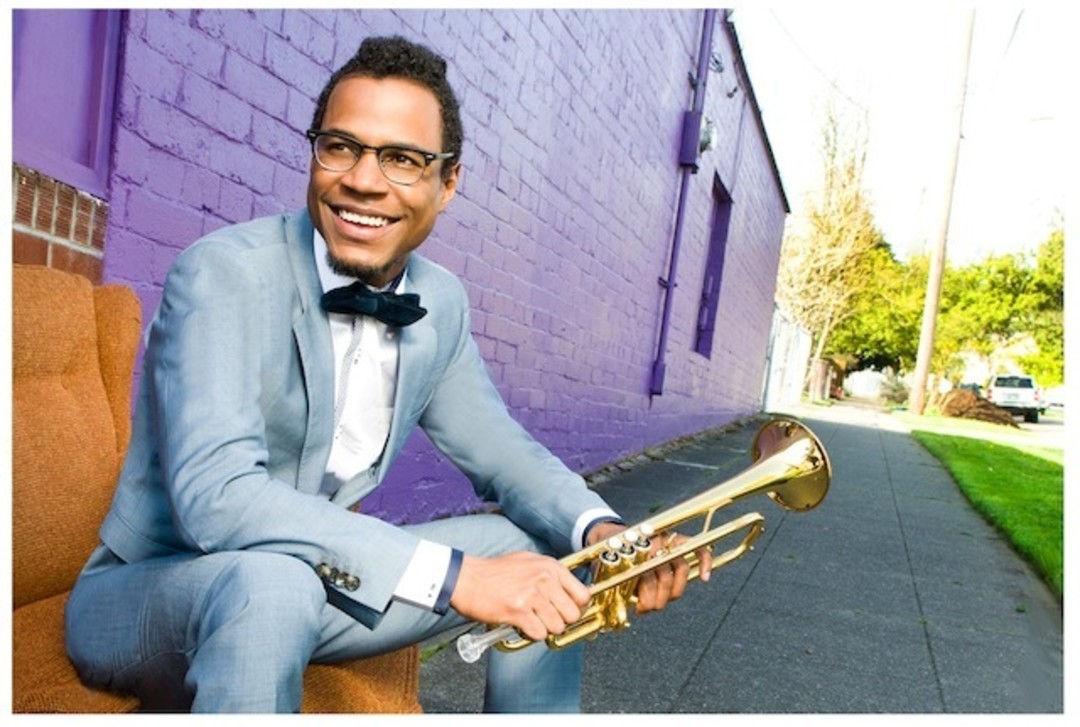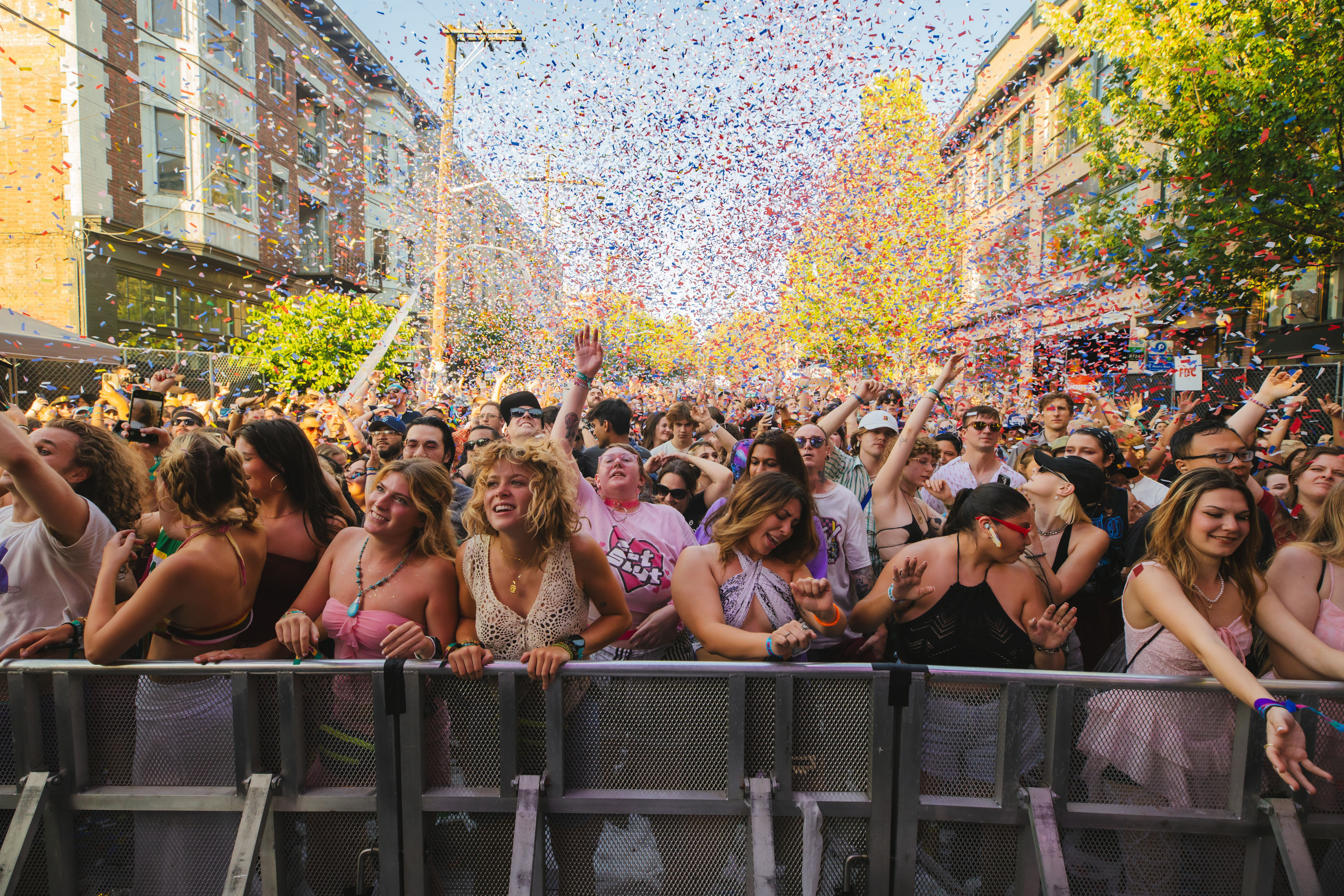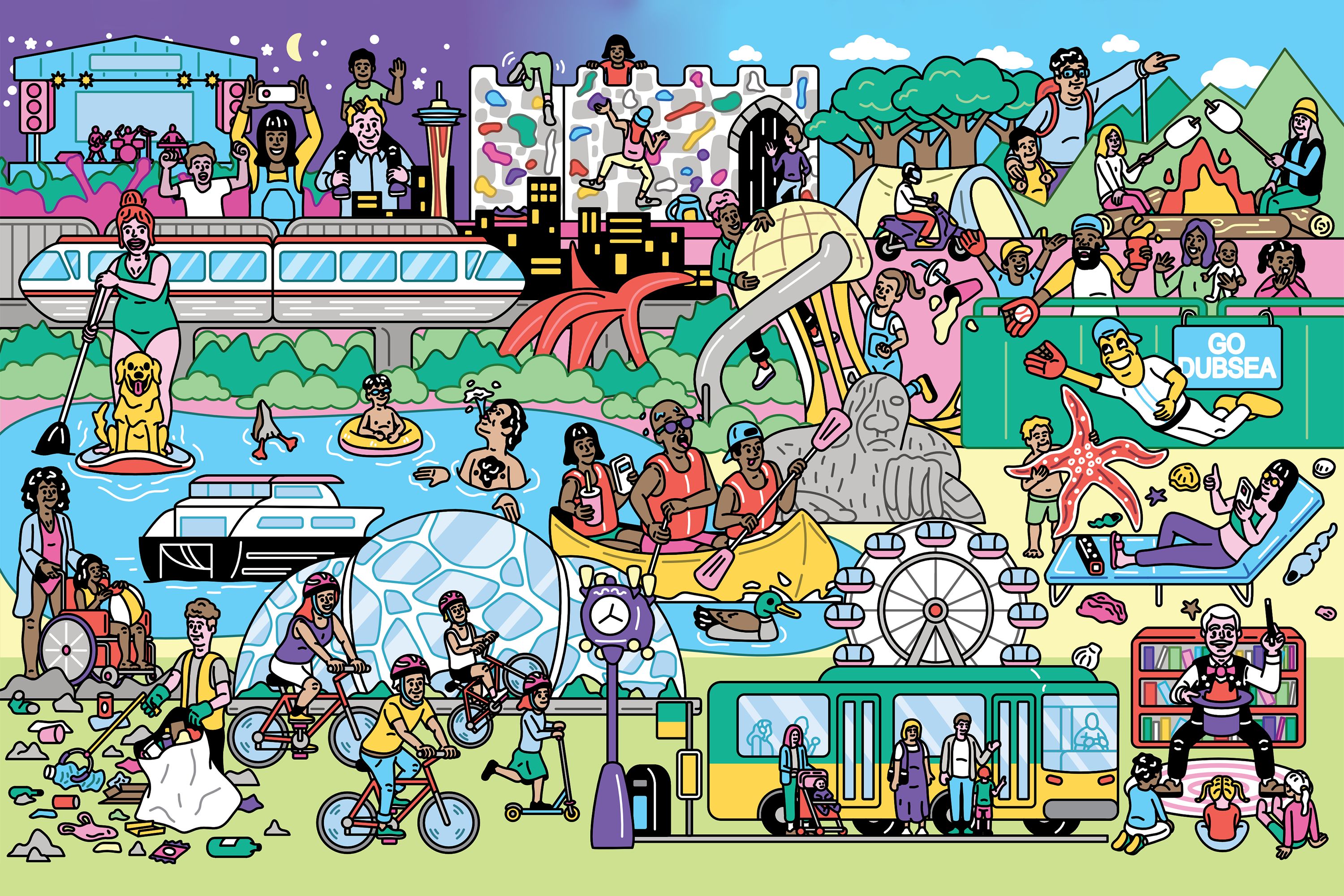A Fiendish Conversation with Owuor Arunga

The dapper Owour Arunga.
There aren't many brass players of renown in modern pop music, but if you've ever seen Macklemore and Ryan Lewis perform, you'd probably recognize trumpeter Owuor Arunga as the beacon of positive energy manically running around stage and blowing into his horn with childlike glee. The Kenyan native has been making waves in the Seattle music scene since his formative days playing in Garfield High School's jazz band, and has since gained national attention as the third cog in the Macklemore and Ryan Lewis's musical machine; touring across the world and bouncing around stage as duo's trumpet maestro and unofficial hype man. Arunga reconnects with his Seattle jazz roots this weekend as part of Timeless—production company Big World Breaks 10th anniversary show—on July 19 at the Neptune Theatre (part of the free Nights at the Neptune series). The performance features talent that spans multiple generations including Arunga, some of the teachers who mentored him, the Seattle JazzED program's summer ambassadors, the Washington Middle School Drum Line, and more.
For our latest Fiendish Conversation, we chatted with Arunga about adapating to play with different artists, using music as a weapon, and traveling to the Moon.
What part of the Timeless show are you most excited about?
I’m just looking forward to the reunion. (Big World Breaks founder) Aaron Walker-Loud was kinda like my big homie. Then you have Robert Knatt, who was my first jazz teacher. Then you have Clarence Acox who was kind of the teacher who refined my performance skills, and one of the people who first put me on a world stage. It’s like a lineage of different levels of mentors all coming together. As you grow, you realize that it’s kind of a circle, like if you watch The Lion King - the circle of life. So now we’re working on the next generation of mentors and apprentices. So that’s what I’m looking forward to; watching the continuum of musical community happen.
Speaking to that, who are the emerging young talents in Seattle that you think people should check out?
I would definitely say Otieno Terry; incredible vocalist. Just like everything he does on the microphone right now is golden. I would say for me, he’s the one that stands out. He’s a young guy, great voice, great attitude, great work ethic. I think he’s going to go far. Really far.
You seem to constantly be bouncing and around and playing all types of shows: jazz, hip-hop, etc. What makes you want to stay so active?
I just love all music. Coming up in Seattle, I was just playing every day and every show is different. One day I’d be playing with the Sounders marching band. The next day I’d be playing with Wheedle’s Groove. The next day I’d be playing with Kore Ionz. The next day I’d go do a show with the Physics. And then I’d shoot over and do a show with Mac and Ryan. And then I’d go play a show with Big World Breaks. It was always part of the fabric of my journey as a musician to constantly challenge myself and try to understand music like a language. So I’m still trying to manifest that constantly. The trumpet’s the type of instrument that is unforgiving, so you constantly have to engage it and engage different styles of music.
And right now, I think the style of shows that I’m doing is more based on a purpose, where before it was like… I just wanted to master my instrument and I didn’t care (about what the show was). I was like, “Yes! Yes! Yes! Yes!” But now its more like, “How can we use music more as a tool, as a weapon, and recognize the platform that we’re privileged to have right now to do something greater?” One of my mentors, Louis Reyes Rivera, would say, “(Use) music as a weapon,” not just music for the sake of music, but music for a purpose. Music as a higher calling, but also music that can serve. So that’s what I try to embody.
So if music is a weapon, what are you trying to fight?
Well, if you look at the 21st century, I feel like it’s, to a certain degree, the generation of underserved youth. You know, like everybody’s is going to say, “Back in the day we had analog records and things were so much better! [Laughs] The quality! People cared about what they said.” And I think that’s mostly true for music education, and education as a whole. I think today, we’re kind of struggling to keep the cultural context of American music rooted. Like you listen to KUBE 93 and its Old School Lunch, and it’s Nelly on the radio. When I think of Old School Lunch, I think we should really go back, you know what I’m saying?
So that’s, in a metaphoric way, kind of like what I feel is going on. We have underserved youth, specifically in music education, and if you go to the Central District or the South End or these areas where they’re kind of hidden, you don’t hear about this stuff that goes on there the news. You hear about the negative things, but you don’t hear about everything else; the things we really need. We hear about the war on drugs, but we don’t really hear about the war for education. And that’s really for me what the weapon is: the weapon of sound, the weapon of love, the weapon of camaraderie, the weapon of sharing.
What’s the key to being able to adapt and play with so many diverse artists?
I think there are three major lessons I’ve gotten. One of my teachers, Bobby Sanabria always said (the key was) hard work and attention to detail. Another teacher of mine—Ahmed Abdullah, who was really close with Sun Ra— always said that discipline; there’s a certain level of discipline you have to put into it. And the other lesson I got was from this book, The Artist’s Way. There was a chapter where Julia Cameron talked about how you have to suck in order to get good. You don’t just like pop out of the womb incredible: you have to put yourself on the line, you have to be willing to make mistakes, you have to be willing to embark on that journey. You don’t expect to hit your target right away. Really you are the target and you’re working on cultivating something.
And when you take those three things, first of all you’re open to trying new things. Then second, you’re open to practicing them until you get to a point of mastery. And third, you know that anything is possible. I think those three things are a way of being an artist. You’re able to reinvent yourself, you’re able to step into different themes and take on different characters, and look at music less as a craft and more of an adventure, a dream state, a place that taps into the imagination, a vision. And you start to meld those two worlds—the craft and the adventure—into something that is an expression of who you are. And everything you do just ends up being a connection between art and life.
If you weren’t a musician, is there any other line of would’ve wanted to pursue?
A gigolo. Definitely a gigolo. In Prague. I’d be a gigolo in Prague.
Do you have a pre-show routine?
No doubt. Definitely. [Laughs] Absolutely. Before every show… it’s kind of mystical though. [Laughs] There’s a mantra that I tell myself and try and tap into. Because I play shows every day. And even with Macklemore and Ryan Lewis, for instance, we (perform) like it’s a play. So you’re doing this play and you’re doing it every day in a different city and it plays mind games on you. So I really try to tap into that mental state where you’re able to relax and you’re able to call upon the beautiful faculties of the mind and kind of ground yourself; become present in the moment. I have a prayer and I have certain mental faculties that I try to align and become more aware of. There’s like thirteen of them that I just constantly say over and over again. And the more I say them, I become more and more relaxed and my body knows that okay, now it’s go time. It’s time to get in tune. So yeah, I just talk to myself for 30 minutes, play really low, long tones, and that’s how I do it.
Having been along for the ride as Macklemore and Ryan Lewis rose to stardom, are there any moments that stick out as particularly crazy or meaningful?
I feel that a lot of the times we work the people with whom we work is because like minds attract. And for me, I’ve always been somebody who’s into self-actualization. And the craziest thing for me is to realize that if you think of something and you really focus your energy and mental attention towards it, it happens. So literally you’re limitless in what you’re able to do. For instance, if I wanted to go visit the Moon in ten years, if I focused every day on getting to the Moon, I probably would get there. There’s a 99.9 percent chance that in 2024, I’m going to be sipping a piña colada on the Moon. And that, to me, is crazy. The fact that everything real comes from an idea and a monastic dedication to focusing on that idea. That’s insane. It’s like a license to do whatever. That’s amazing to me. That would be the craziest thing, the idea that anything is possible.
Timeless
July 19 at 8, Neptune Theatre, Free




